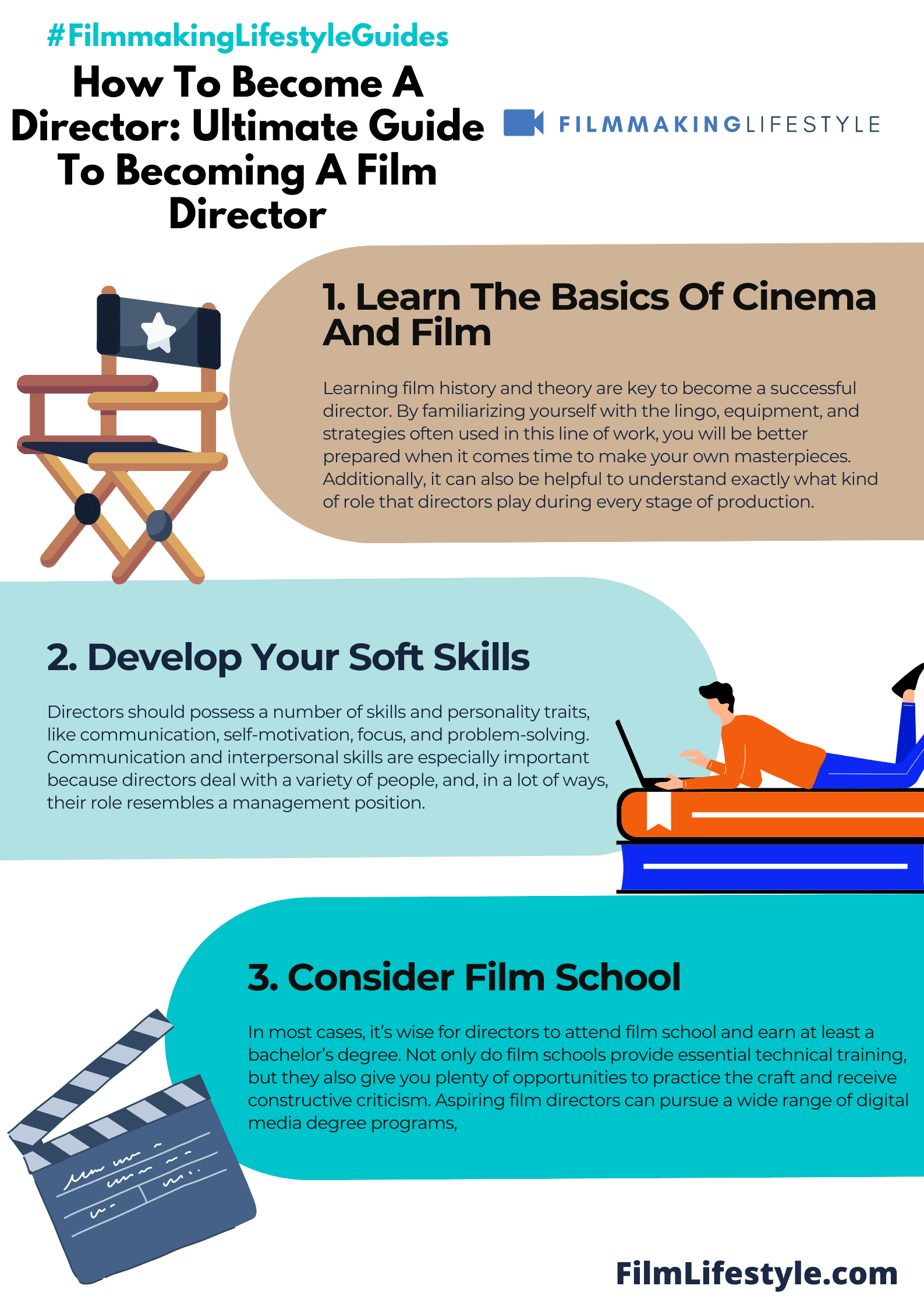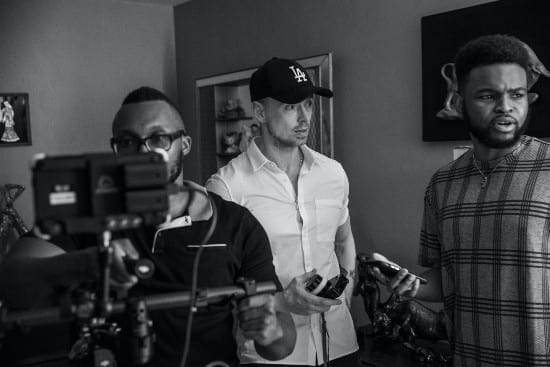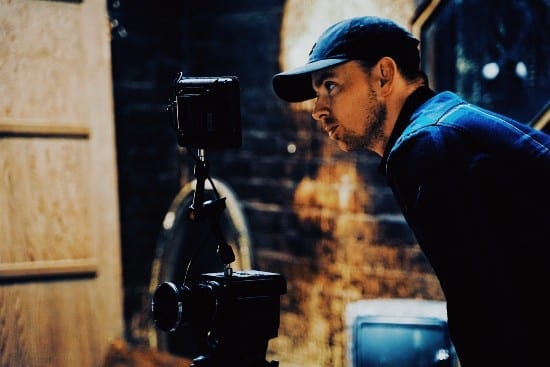Dreaming of calling “Action!
” on a bustling film set?
We’ve all been mesmerized by the magic of cinema, but stepping into the director’s chair is a journey of its own.
Becoming a director isn’t just about having a creative vision; it’s about mastering the art of storytelling and leadership.
In this article, we’ll guide you through the essential steps to turn your directorial dreams into action-packed reality.
We’ll explore the importance of education, gaining experience, and building a network in the film industry.
Whether you’re aiming for indie films or blockbuster hits, we’ve got the insider tips to help you navigate the path to directing success.
Keep reading as we unveil the roadmap that could lead you to your very own director’s clapboard.
The Importance Of Education
Gone are the days when filmmaking was an enigmatic art learned through whispered secrets on set.
Today, education in the cinematic arts serves as a critical foundation for anyone serious about becoming a director.
It’s not just about learning how to call “action” or “cut” – a formal education can teach the technical skills and theories behind storytelling that are essential for success.
At prestigious schools like USC’s School of Cinematic Arts or NYU’s Tisch School of the Arts, students are submerged in an environment steeped in film history and practical learning.
They gain access to:
- Cutting-edge equipment,
- Industry-standard software,
- Guidance from experienced professionals.
This combination can be invaluable.
But let’s not limit ourselves to traditional degrees.
Workshops, online courses, and film schools offer flexibility and specialized knowledge tailored to fit various schedules and learning styles.
Skillsets such as screenplay writing, editing, cinematography, and sound design are crucial for directors to understand, even if they won’t be doing each task personally.
A director’s vision is only as strong as their understanding of the craft.
By investing in education, up-and-coming directors prepare to overcome the challenges they’ll face in the industry.
We don’t just advocate for learning the ropes – we urge you to keep abreast of new technologies and storytelling methods that continue to evolve in the world of film.
With film ever-changing, lifelong learning is the hidden secret to a successful directing career.
It keeps us adaptable, innovative, and ready to lead projects that resonate with modern audiences.
Open up to the power of education and let it be the compass that guides your artistic journey.
Gaining Experience In The Film Industry
Experience in the film industry is a cornerstone for evolving into a proficient director.
Directing requires not just a creative vision but also the competence to turn that vision into reality.
We understand practical experience is as valuable as formal education.
Diving into the world of filmmaking, we often advise aspiring directors to seek hands-on opportunities that elevate their understanding and skills.
Starting at the bottom might seem daunting but it’s a practical approach to grasp the intricacies of film production.
Many famous directors began their careers with jobs like production assistants or script supervisors.
These roles offer a vantage point to observe every aspect of the set, from pre-production planning to the final wrap-up.

The hustle and occasional grunt work arm us with a resilient mindset that’s crucial for leading a film project.
Here is a list of avenues to consider for gaining imperative experience –
- Internships with production companies or screenwriters,
- Assistant roles for directors or producers,
- Collaborative projects like short films with peers,
- Volunteering for film festivals or local theater productions.
Networking is indispensable in our journey as filmmakers.
It opens doors to mentorships, collaborations, and even job opportunities.
We always remind ourselves that the film industry is propelled by relationships.
Engaging with fellow creatives at workshops, seminars, and film clubs fosters connections that might lead to our next big project.
Crafting a robust portfolio is another step we cannot overlook.
Showcasing our work, whether it is a series of short films or a feature-length project, is pivotal.
It demonstrates our style and storytelling abilities.
Through platforms like Vimeo or our own websites, we can present our films to a wider audience including potential investors and collaborators.
Immersing ourselves in diverse roles within the industry, actively networking, and continually building our portfolio are actions we take seriously.
They form the bedrock of our evolving directing career, allowing us not only to adapt but thrive in the dynamic world of film.
Building A Network
In an industry where who you know can be as crucial as what you know, building a strong network is indispensable.
We can’t stress enough how vital it is to connect with peers, mentors, and industry professionals.
Engaging with local film communities and joining film groups can lead to valuable relationships.
These connections can open doors to new projects, collaborations, and opportunities.
Attending film festivals and industry events is another avenue to expand our network.
We’ll meet filmmakers, distributors, and potential investors all gathered in one place, creating an ideal networking environment.
We should remember to Use social media and professional networking sites to showcase our work and connect with a global audience.
Platforms like LinkedIn and Instagram provide us with tools to reach out to industry veterans and fellow aspiring directors.
By staying active in online filmmaking forums and participating in discussions, we establish ourselves as a part of the community.
This online presence can be just as important as our real-world interactions.
We must follow up with every new contact and maintain those relationships.
Whether it’s a quick email update or sharing a piece of news on a recent achievement, keeping the conversation going is key.
Here are a few strategies we find effective:
- Send personalized messages after meetings or events – this shows genuine interest and helps solidify new connections,
- Engage in collaborations on smaller projects – these can lead to more significant opportunities over time,
- Offer help before asking for favors – this sets a foundation of goodwill and mutual respect.
Through desire, dedication, and strategic networking, we pave our path within the film industry.
As we forge these connections and foster these relationships, our journey as directors gains momentum.
Mastering The Art Of Storytelling
We cannot overstate the importance of storytelling in the film director’s craft.
As directors, we’re at the helm of translating scripts into compelling visuals that capture an audience’s imagination.
Our mastery of storytelling is evident in our ability to convey emotions and experiences through the lens.
We leverage narrative techniques to enhance the viewer’s connection with the story.
We recognize that stories resonate differently across various media.
While filmmakers focus on visual and auditory elements, authors of books rely on descriptive language, and we adapt our methods accordingly.
Understanding the structure of a great story is fundamental – – Beginning with a strong hook
- Building with engaging conflict,
- Leading to a satisfying climax.
We pay close attention to character development and pacing.
Characters must evolve and pacing needs to align with the narrative to keep viewers invested.
Powerful stories often have universal themes.
We tap into these to create a sense of relatability and timelessness in our works.
We’re well-versed in the language of cinema.
We use camera angles, lighting, and editing to support the narrative and draw the audience deeper into the story world.
Every film genre requires a different storytelling approach.
Comedies thrive on timing, dramas depend on tension, and action films demand kinetic energy, so we’re always honing our genre-specific storytelling skills.
Crafting a memorable story involves layering subtext and themes beneath the surface narrative.
We understand the art of subtlety and how to weave deeper meaning into our films.
Our storytelling extends beyond what’s on the page or screen.
We enforce the story’s impact through sound design, music, and carefully selected dialogue.
We stay current with cinematic trends while respecting timeless storytelling principles.
Innovation and tradition go hand-in-hand in our storytelling toolbox.
Engaging audiences with impactful stories demands both creativity and discipline.
By mastering the nuances of storytelling, we maintain the heartbeat of cinema and keep viewers returning for more.
Leadership Skills For Directors
In the ever-evolving world of filmmaking, it’s vital for directors to possess strong leadership skills.
At the core, leadership is about inspiring and managing a diverse team to realize a shared vision.
Effective communication is the cornerstone of any successful director.
It ensures that every team member, from actors to the editing crew, understands the expectations and goals of the project.
Without clear guidance, a production can quickly derail.
We know that decision-making prowess separates the good from the great directors.
They must make choices that affect every aspect of a production, often under considerable pressure and with significant financial implications.
Negotiation skills can’t be overlooked when discussing a director’s toolkit.
A director often needs to mediate between conflicting creative ideas and logistical limitations, all while keeping the project on track.
Here are some key leadership qualities every director should aim to develop:
- Strong Vision – to guide the filmmaking process and provide a clear goal.
- Adaptability – to pivot when unexpected challenges arise.
- Collaboration – to welcome input and forge a harmonious team dynamic.
finally, directors must exhibit emotional intelligence.
Understanding and handling one’s own emotions, as well as empathizing with the cast and crew, can significantly enhance the working environment and, by extension, the quality of the film.
How To Become A Director – Wrap Up
We’ve explored the multifaceted path to becoming a director and understand the dedication it requires.
Armed with a solid education and a mastery of storytelling techniques, we’re equipped to breathe life into our cinematic visions.
Embracing leadership skills ensures we can steer our creative ship through the tumultuous waters of film production.
Let’s harness our creativity, discipline, and passion for the craft to create compelling narratives that resonate with audiences.
It’s our time to step behind the camera and lead with confidence, shaping the future of cinema with every frame.
Frequently Asked Questions
What Are The Key Takeaways From The Article On Becoming A Film Director?
The article emphasizes the importance of education in film, hands-on experience with industry-standard equipment, and the benefits of learning from experienced professionals.
It underlines the significance of storytelling mastery, creative use of film techniques, and leadership skills such as communication and emotional intelligence for directors.
Why Is Education Important For A Film Director?
Education provides film directors access to the necessary tools, knowledge, and mentorship required to understand and master the craft of filmmaking.
Prestigious programs offer industry-standard technology and guidance from seasoned professionals, which is crucial for overcoming challenges in the film industry.
Can Online Courses And Workshops Be Beneficial For Aspiring Directors?
Yes, online courses and workshops offer flexibility and specialized knowledge that can be very beneficial for aspiring directors.
They can provide a solid foundation and enhance a director’s understanding of the cinematic arts, allowing for continuous learning and skill development.
How Does Storytelling Play A Role In A Director’s Craft?
Mastering the art of storytelling is essential for film directors.
It involves using narrative techniques, character development, pacing, and adapting approaches for various genres.
A director must creatively employ camera angles, lighting, editing, sound, and music to support the story and engage the audience.
Why Are Leadership Skills Vital For Film Directors?
Leadership skills are crucial for film directors to inspire and manage their teams effectively.
These include communication, decision-making, negotiation, and emotional intelligence.
A director must have a strong vision and be adaptable, collaborative, and emotionally intelligent to realize a film project successfully.











